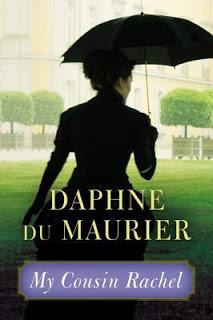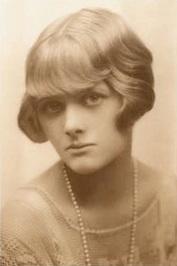
ABOUT THE BOOK:
Orphaned at an early age, Philip Ashley is raised by his benevolent older cousin, Ambrose. Resolutely single, Ambrose delights in Philip as his heir, a man who will love his grand home as much as he does himself. But the cosy world the two construct is shattered when Ambrose sets off on a trip to Florence. There he falls in love and marries - and there he dies suddenly. Jealous of his marriage, racked by suspicion at the hints in Ambrose's letters, and grief-stricken by his death, Philip prepares to meet his cousin's widow with hatred in his heart. Despite himself, Philip is drawn to this beautiful, sophisticated, mysterious Rachel like a moth to the flame. And yet... might she have had a hand in Ambrose's death?
MY REVIEW:
 My Cousin Rachel by Daphne du Maurier
My Cousin Rachel by Daphne du MaurierMy rating: 5 of 5 stars
My Cousin Rachel by Daphne du Maurier is a 1952 publication. This version is the 2013 Little, Brown and Company publication.
A scathingly wicked masterpiece-
This book has a very heavy atmospheric quality that drew me in right from the start. In fact, I was so transfixed, I put aside everything else and gave myself over to its allure.
Phillip Ashley was raised by his cousin, Ambrose, a confirmed bachelor. They are content with their arrangement, and with Phillip’s role as heir to Ambrose’s legacy.
However, Phillip’s complacency is upended quite unexpectedly when Ambrose travels to Florence, meets ‘our cousin, Rachel’, a woman with a connection to their family, and immediately falls under her spell.
In a shockingly brief period of time, Ambrose goes from wedded bliss to death, leaving Phillip furious with Rachel, suspecting her of contributing to his cousin’s demise in some way, shape, or form.
But, when Rachel shows up at his doorstep with Ambrose’s belongings, Phillip too finds himself enchanted by Rachel and soon forgets all about his earlier jealousies and suspicions. Until…
I have several books in my collection written by this author, but the only one I’ve read is, ‘Rebecca’,
When this book began to recirculate due to a motion picture and a ‘great library reads’ promo, my interest was highly piqued.
Finally, I managed to work it into my schedule, but I wish I had discovered this gem sooner!
This book has so many layers, yet it progresses slowly, adding sinister nuances, bit by bit, until I found myself helplessly trapped in the author’s, oh so clever web before I knew what had happened, maybe a bit like Phillip, eh?
This book combines Gothic mystery, strong feminist undertones, psychological mind games, vanity, guilt, and suspicion, which nearly made me delirious with delight. But, it also left me with a plethora of theories and speculations.
Is Rachel guilty… or was it really Phillip? Or was she Innocent? Both? Was Phillip just a pawn in Rachel’s master plan? Did Phillip needlessly destroy his life?
While I would ordinarily feel extreme frustration with an author for this open- ended conclusion, in this case, it’s exactly what makes this book a classic. Written back in 1952, the book was a little ahead of its time, although some may have only taken it at face value. Nevertheless, here we are in 2017, still talking about it, still pondering on its mysteries, analyzing, and theorizing about it, which is a testament to the author’s talent and genius.
This book was practically tailor made for my reading tastes, so naturally, it gets five big stars!!

GET YOU COPY HERE:
THE COPY I REVIEWED IS AVAILABLE IN THE OVERDRIVE LIBRARY AND BARNES & NOBLE
https://www.barnesandnoble.com/w/my-cousin-rachel-daphne-du-maurier-dame/1003935593
OTHER OPTIONS:
https://www.amazon.com/My-Cousin-Rachel-Daphne-Maurier-ebook/dp/B00GR5MZFU/
ABOUT THE AUTHOR:

If Daphne du Maurier had written only Rebecca, she would still be one of the great shapers of popular culture and the modern imagination. Few writers have created more magical and mysterious places than Jamaica Inn and Manderley, buildings invested with a rich character that gives them a memorable life of their own.
In many ways the life of Daphne du Maurier resembles a fairy tale. Born into a family with a rich artistic and historical background, the daughter of a famous actor-manager, she was indulged as a child and grew up enjoying enormous freedom from financial and parental restraint. She spent her youth sailing boats, traveling on the Continent with friends, and writing stories. A prestigious publishing house accepted her first novel when she was in her early twenties, and its publication brought her not only fame but the attentions of a handsome soldier, Major (later Lieutenant-General Sir) Frederick Browning, whom she married.
Her subsequent novels became bestsellers, earning her enormous wealth and fame. While Alfred Hitchcock's film based upon her novel proceeded to make her one of the best-known authors in the world, she enjoyed the life of a fairy princess in a mansion in Cornwall called Menabilly, which served as the model for Manderley in Rebecca.
Daphne du Maurier was obsessed with the past. She intensively researched the lives of Francis and Anthony Bacon, the history of Cornwall, the Regency period, and nineteenth-century France and England, Above all, however, she was obsessed with her own family history, which she chronicled in 'Gerald: a Portrait', a biography of her father; 'The du Mauriers', a study of her family which focused on her grandfather, George du Maurier, the novelist and illustrator for Punch; 'The Glassblowers', a novel based upon the lives of her du Maurier ancestors; and 'Growing Pains', an autobiography that ignores nearly 50 years of her life in favour of the joyful and more romantic period of her youth. Daphne du Maurier can best be understood in terms of her remarkable and paradoxical family, the ghosts which haunted her life and fiction.
While contemporary writers were dealing critically with such subjects as the war, alienation, religion, poverty, Marxism, psychology and art, and experimenting with new techniques such as the stream of consciousness, du Maurier produced 'old-fashioned' novels with straightforward narratives that appealed to a popular audience's love or fantasy, adventure, sexuality and mystery. At an early age, she recognised that her readership was comprised principally of women, and she cultivated their loyal following through several decades by embodying their desires and dreams in her novels and short stories.
In some of her novels, however, she went beyond the technique of the formulaic romance to achieve a powerful psychological realism reflecting her intense feelings about her father, and to a lesser degree, her mother. This vision, which underlies 'Julius', 'Rebecca' and 'The Parasites', is that of an author overwhelmed by the memory of her father's commanding presence. In 'Julius' and 'The Parasites,' for example, she introduces the image of a domineering but deadly father and the daring subject of incest.
In 'Rebecca', on the other hand, du Maurier fuses psychological realism with a sophisticated version of the Cinderella story. The nameless heroine has been saved from a life of drudgery by marrying a handsome, wealthy aristocrat, but unlike the Prince in Cinderella, Maxim de Winter is old enough to be the narrator's father. The narrator thus must do battle with The Other Woman - the dead Rebecca and her witch-like surrogate, Mrs Danvers - to win the love of her husband and father-figure.
http://www.dumaurier.org/obituary.html

